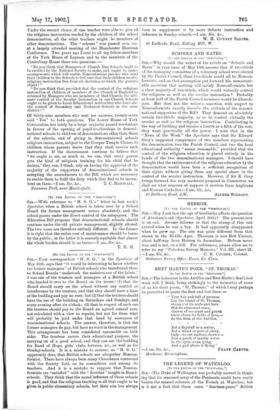[TO THE EDITOR OF THE " SPECTATOR.") SIR,—Your correspondent "
H. S. G.," in the Spectator of May 10th, says that "it would be interesting to know whether the former managers " of British schools who transferred them to School Boards "undertook the maintenance of the fabric.- I was one of the trustees and managers of a British school who handed it over to the Board on the terms : (1) that the Board should carry on the school without any control or interference by the trustees, and that they should have a lease of the building and pay no rent; but (2) that the trustees should have the use of the building on Saturdays and Sundays, and every evening after six o'clock ; (3) that in respect of such use the trustees should pay to the Board an agreed annual sum, not calculated with a view to repairs, but not far from what will probably be paid under that head by managers of denominational schools. The answer, therefore, is that the former managers do pay, but have no voice in the management. This arrangement has been considered reasonable on both sides. The trustees secure their educational purpose, the carrying on of a good school, and they can use the building for Band of Hope, girls' clubs, lectures, &c., as well as for Sunday-schools. It is a mistake to assume, as " H. S. G." apparently does, that British schools are altogether Noncon- formist. There have always been many Churchmen connected with the Society both on its committees and among its teachers. And it is a mistake to suppose that Noncon- formists are "satisfied " with the " doctrine " taught in Board- schools. They think that the moral influence of those schools is good, and that the religions teaching is all that ought to be given in public elementary schools, but their aim has always
been to supplement it by more definite instruction and influence in Sunday-schools.—I am, Sir, &c.,
W. H. GURNEY SALTER.
40 Ladbroke Road, Notting Hill, W.






































 Previous page
Previous page